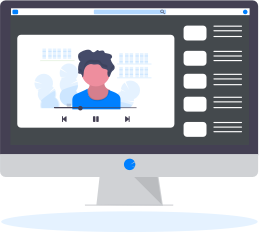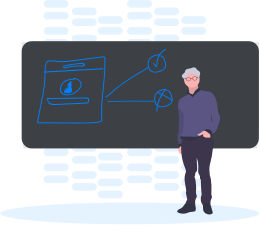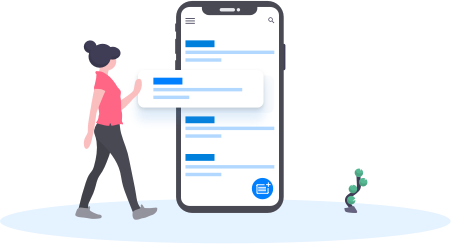



































































































































Why Learncab?



Structured Learning



Expert Faculty



Unmatched Pricing



Full Syllabus
Want to Know More
CMA Intermediate Video Classes



CMA Intermediate Online Classes
Subscription at LearnCab gives you access to the complete syllabus of CMA Intermediate Online Classes. There are no hidden fees or additional charges on the platform once you become a subscriber. Most CMA Intermediate Online Coaching options lock you with pricing for Individual subject or papers. At LearnCab you may view our CMA Intermediate Video Lectures unlimited number of times with High Quality video-based online learning platform, using cutting edge technology that is easy to use, encompassing all subjects delivered by the best faculty.
The CMA Intermediate Video Classes on LearnCab have been developed by the expert faculty using a structured learning process and the latest student-friendly teaching methodologies. The lectures are shot using state of the art professional equipment in dedicated studios.
Topic-wise concise CMA Intermediate videos at LearnCab has been a great success with our students as they have been able to save substantial amounts of time compared to conventional CMA Intermediate Training.
Our sequential playlists include CMA Intermediate Video Lectures along with CMA Intermediate Study Materials and quizzes to test your knowledge of each topic taught.
Mock exams and MCQ’s are published when exams are near to help boost the student’s belief in tackling their CMA Intermediate exams.
LearnCab CMA Intermediate Course covers the entire syllabus prescribed by ICWAI for the CMA Intermediate level exam. This eliminates the need to buy multiple classes from different course providers. Everything the CMA Intermediate student requires available under one single roof.
Features
Study anytime anywhere with the most adaptable stage for CMA Intermediate Video Lectures.
LearnCab CMA Intermediate Video Classes are accessible both on the web and on iOS and Android Apps.
Absolutely seamless experience is free of device utilized. Start viewing LearnCab CMA Intermediate Online Classes on your work area/PC at home and seamlessly switch over to your portable/tablet while progressing. You will always start from where you halted on the previous device.
Simple to utilize a flexible platform with an organized learning approach. Our consecutive playlists comprising of CMA Intermediate Video Lectures, Illustrated Notes and Quizzes assist Students to grasp the concepts at the first viewing itself. The students can spare a great deal of time by considering LearnCab compared to conventional study methods.
If you want to become a cost management accountant, you need to achieve expertise in the domain of financial accounting. The paper Financial Accounting at CMA Intermediate Level is built on the concepts learned from the CMA Foundation (Fundamentals of Accounting). At the CMA Foundation level, you were introduced to the Fundamentals of Accounting. Here, you get a working knowledge of the accounting concepts involved in Financial Accounting. You also learn how to present and construct financial statements that are understandable to the relevant stakeholders. Special emphasis is given to accounting in the computerized environment.
The approach taken by our faculty in teaching you this subject is to provide you with a lot of practice problems. Make sure that you try solving them before looking at the solution. Also, you should keep up to date with the latest accounting standards. We update our CMA Intermediate course material to reflect the latest changes in the CMA Intermediate syllabus so that you do not have to go hunting around in search of updated study materials.
The faculty in charge of teaching CMA Intermediate Financial Accounting paper is CA Chinmaya Hegde. His teaching experience covers all three levels of the Chartered Accountancy Course over a period of 6 years in various academies such as Samvit Academy and CAPs. He is a rank holder in all three levels (13th rank in CA Foundation, 3rd rank in CA Intermediate and 39th rank in CA Final.)
As a CMA, you would need to understand the laws and environment under which businesses operate in India. Due to the professional nature of the job, you will be responsible for many important stakeholders including the government. As such, you need to conduct yourself with a high degree of professionalism and with the utmost integrity. The paper, Laws & Ethics, builds on the concepts you learned at the CMA Foundation level. You will understand, to a greater depth, various business laws, with special emphasis on online contracts, etc. You will also get a better grounding in ethical principles.
The major challenges students face in CMA Intermediate law papers is to (i) keep updated with the latest changes in legislation and (ii) remember the appropriate section numbers and the wording of the law. At the LearnCab CMA Intermediate course, we keep updating our content so that you do not have to spend time and effort to acquire study materials elsewhere. Also, you should not be passively watching the CMA Intermediate videos. Take short notes and map out keywords while watching. This will help reinforce the concepts in your mind.
The faculty in charge of CMA Intermediate Laws & Ethics paper is CS Dattari HM. He is a Company Secretary and Lawyer by qualification. He holds 2nd rank from Mysore University. Mr. Dattatri has over 16+ years of hands-on experience in corporate, legal, secretarial matters. He was the Chairman of the Institute of Company Secretaries of India, Bangalore Chapter.
This paper, Cost and Management Accounting, is more commonly known as costing. It is one of the most interesting papers in the CA intermediate course. Costing is important for a CA acting as a consultant for businesses. Businesses need to keep their costs at a minimum, as well as leverage their resources properly. As a CA, you are tasked to identify ways to maximize revenue and ensure that the company runs smoothly in terms of operations.
Students face difficulty in the paper due to the following reasons:
- Ignoring theory
- Inadequate practice (written or otherwise!)
- Not referring to the previous papers
- Lack of understanding of formulae and concepts
If you analyze these reasons, it all boils down to fear and the reputation of the paper. That is why the faculty who teaches CA Intermediate costing paper says that you do not have to fear this particular subject. Costing comes down to common sense. With a good understanding of theory, you should be able to do well. It is also a great chance for you to gain an exemption!
The way the faculty approach the study is by emphasizing the fundamentals and showing you how they are applied in various situations. They go over past exam papers and suggested answers from the Institute. At LearnCab ca intermediate online classes, we will provide you with further mock exams and papers so that you get enough practice to be prepared.
The faculty encourage you to ask questions to help clear your doubts. You can use our doubt clearing facility where we forward your questions to the relevant subject matter experts.
While studying, we suggest that you take an active role rather than a passive one. You should take short notes while you watch CA Intermediate costing videos. This way you will retain concepts in your memory. Our illustrated notes that provide a concise summary of the videos will also help you in this regard.
Faculties teaching CA Intermediate Cost and Management Accounting paper are: CA Hariharan and CMA Raveendranath Kaushik.
CA Hariharan is one of the most well-known and popular faculty for Costing at ICAI branches and various institutions in South India. He has over 10+ years in teaching CA students and is fondly known as the “Costing Guru”. A recipient of the CM’s award in excellence in Academics, he is dedicated and passionate about teaching. This is reflected in his amazing record of 38 continuous hours of teaching at the ICAI Trivandrum branch.
CMA Raveendranath Kaushik is a Cost and Management Accountant by profession. He has over 8 years’ teaching experience as a trainer for students of Professional courses (CA/CS/CMA) at various institutions and professional bodies. He is also the guest faculty at ICAI Bengaluru chapter. He holds PG degrees in Economics, Finance and Tax laws, and is also an MPhil in Economics. He is certified by IIT (Institute of International Trade) – Centre for WTO Studies in International Taxation. He is currently a consultant at Raveendranath Kaushik & Associates.
As a CMA, this paper, Cost Accounting, shores up your core competency areas. You need to understand these concepts in detail. Acting as an advisor to businesses, you need to know how to help them control their costs. You need to understand the relationship between Cost Accounting, Management Accounting, and Financial Accounting. Our unique credit-based subscription model helps you to quickly go through all these topics so that you get a holistic idea of how everything is inter-related. Not only that, we have study notes that supplement our CMA Intermediate video lectures. This way, you do not need to refer to the videos each time when you want a quick and concise summary of the content.
Faculties teaching CMA Intermediate Cost Accounting paper are CA Hariharan. He is one of the most well-known and popular faculty for Costing at ICAI branches and various institutions in South India. He has over 10+ years in teaching CA students and is fondly known as the “Costing Guru”. A recipient of the CM’s award in excellence in Academics, he is dedicated and passionate about teaching. This is reflected in his amazing record of 38 continuous hours of teaching at the ICAI Trivandrum branch.
The other faculty is CMA Raveendranath Kaushik. He is a Cost and Management Accountant by profession. He has over 8 years’ teaching experience as a trainer for students of Professional courses (CA/CS/CMA) at various institutions and professional bodies. He is also the guest faculty at ICAI Bengaluru chapter. He holds PG degrees in Economics, Finance and Tax laws, and is also an MPhil in Economics. He is certified by IIT (Institute of International Trade) – Centre for WTO Studies in International Taxation. He is currently a consultant at Raveendranath Kaushik & Associates.
As a CMA, you need to be able to identify ways and means to help businesses reduce their costs. To help you do this, you need to understand how the business process works as well as its operations. You should also understand how and why product planning works along with how best to manage resources. You should understand the mission, vision, and goals of the company to ensure that all decisions taken are in line with the goals laid out.
Under CMA Intermediate Operations Management, you will learn about operations planning, designing of operations system and control, production planning, productivity and quality management, project management and the economics of maintenance and spares management. Under Strategic Management, you will understand strategic analysis and strategic planning such as SWOT analysis, portfolio analysis, BCG Matrices, etc. You will also gain an understanding of the different stages in the strategic formulation process.
The best approach to study CMA Intermediate Operations Management and Strategic Management subject is to first understand the concepts and then solve practical questions immediately. This way you will retain the concepts for a longer tenure and understand your footing on the subject. This is why, at LearnCab CMA Intermediate online classes, you get plenty of practice problems, quizzes, and mock exams to give you the deliberate practice you need to become an expert.
Cost & Management Accounting, as well as Financial Management, is one of the core competency areas of a CMA. As a CMA, you need to identify ways to maximize revenue and ensure that the company runs smoothly in terms of operations. You will help business keep their costs at a minimum and to leverage their resources properly. Financial Management is important because it helps you to make decisions that will maximize the value of the business.
We have renowned faculty teaching this subject. Their passion and enthusiasm for teaching ensures that you learn the concepts well and be able to recall them during the exam.
One of the faculty teaching CMA Intermediate Cost Management & Accounting & Financial Management is CA Hariharan. He is one of the most well-known and popular faculty for Costing at ICAI branches and various institutions in South India. He has over 10+ years in teaching CA students and is fondly known as the “Costing Guru”. A recipient of the CM’s award in excellence in Academics, he is dedicated and passionate about teaching. This is reflected in his amazing record of 38 continuous hours of teaching at the ICAI Trivandrum branch.
The other faculty is CMA Raveendranath Kaushik. He is a Cost and Management Accountant by profession. He has over 8 years’ teaching experience as a trainer for students of Professional courses (CA/CS/CMA) at various institutions and professional bodies. He is also the guest faculty at ICAI Bengaluru chapter. He holds PG degrees in Economics, Finance and Tax laws, and is also an MPhil in Economics. He is certified by IIT (Institute of International Trade) – Centre for WTO Studies in International Taxation. He is currently a consultant at Raveendranath Kaushik & Associates.
In order to make effective business decisions as a CMA, you need to understand the impact of indirect taxes. That is why ICMAI has introduced this paper Indirect Taxation at the CMA Intermediate level. You need to be able to compute the assessable value of transactions under GST. You should also understand the procedure and framework of statues related to indirect taxation.
Our approach to teaching indirect taxation is to provide you with a lot of examples so that you can see how tax is calculated under GST. Also, our faculty who teaches CMA Intermediate Indirect Taxation is CA Praveen Jain is a renowned teacher and has hands-on experience in the field of Indirect Taxation. His 5+ years’ teaching experience at various esteemed academies and Institutions makes him one of the best faculty in this domain. He is a Chartered Accountant by Profession and is a partner at RaguPrashanth & Associates, Chartered Accountants, Coimbatore.
As a CMA, you need to obtain an in-depth knowledge of how to prepare financial statements including procedures, principles and professional standards. You will also need to perform cost audits of companies. As such, you need to have some basic knowledge of other types of audits to get a general idea of the procedure. So, that is why ICMAI has introduced this paper Company Accounts and Audit at the CMA Intermediate level.
You need to perform audits etc. according to the latest auditing standards. That is why, at LearnCab CMA Intermediate online class, we update our content to reflect the latest changes in legislation.
The faculty who teach CMA Intermediate Company Accounts and Audit subject is, CA Vikas Oswal. He has over 12+ years’ experience in teaching auditing for CA Intermediate and CA Final students at ICAI and other private institutions. He is the author of one of the most definitive books on Audit for CA Intermediate/CA IPCC & CA Final students. His way of teaching concepts is dynamic, dramatic and entertaining. An FCA, he holds various diplomas like DISA and ACS.
| Papers | Subjects | No of Lectures |
| Paper 5 | Financial Accounting | 162 |
| Paper 6 | Laws and Ethics | 91 |
| Paper 7 | Direct Taxation | 147 |
| Paper 8 | Cost Accounting | 74 |
| Paper 9 | Operations Management and Strategic Management | 48 |
| Paper 10 | Cost and Management Accounting and Financial Management | 105 |
| Paper 11 | Indirect Taxation | 126 |
| Paper 12 | Company Accounts and Audit | 82 |
| Total | 820 | |
2) Laws & Ethics
3) Direct Taxation
4) Cost Accounting
Our unique credit-based subscription system allows you to watch any CA Intermediate lecture an unlimited number of times as you wish.
Our CA Intermediate Online Classes & video lectures cover the all papers and concepts of CA Intermediate as specified in the ICAI syllabus.
Our students have the freedom to watch what they want when they want on any device they want. Total freedom guaranteed!
1) Passed Senior Secondary School Examination (10+2)and Foundation Course of the Institute of Cost Accountants of India/ Graduation in any discipline other than Fine Arts/ Foundation (Entry Level) Part I Examination of CAT of the Institute/ Foundation (Entry Level) Part I Examination and Competency Level Part II Examination of CAT of the Institute.
2) Passed Foundation of ICSI/Intermediate of ICAI by what ever name called along with 10+2.

